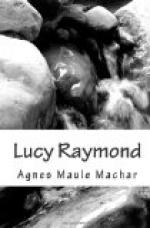“Oh, but,” exclaimed Lucy eagerly, overcoming her shy reluctance to speak, “He is always near, though we can’t see Him, and is ready to help us when we do right, and grieved and displeased when we do wrong. I forget that myself, Stella,” she added with an effort, “or I shouldn’t have been so cross when I came home.”
Stella had already forgotten all about that, and felt a little uncomfortable at her cousin’s entering on subjects which she had been accustomed to consider were to be confined to the pulpit, or at any rate were above her comprehension. She believed, of course, in a general way, that Christ had died for sinners, as she had often heard in church, and that in some vague way she was to be saved and taken to heaven, when she should be obliged to leave this world; but it had never occurred to her that the salvation of which she had been told was to influence her life now, or awaken any love from her in response to the great love which had been shown toward her. Not daring to reply, she glanced listlessly over the hymn on the card, but took up none of its meaning. She had never been conscious of any heavy burden of sin to be “laid on Jesus.” Petted and praised at home for her beauty and lively winning ways, her faults overlooked and her good qualities exaggerated, she had no idea of the evil that lay undeveloped in her nature, shutting out from her heart the love of the meek and lowly Jesus. She could scarcely feel her need of strength for a warfare on which she had never entered; and Lucy’s words, spoken out of the realizing experience she had already had, were to her incomprehensible.
She was a good deal relieved when the tea-bell rang, and Lucy’s two brothers, Fred and Harry, with her tall cousin Alick Steele, joined them as they obeyed the summons to the cool, pleasant dining-room, where Alick’s mother, Mr. Raymond’s sister, who had superintended his family since Mrs. Raymond’s death, was already seated at the tea-table. Her quiet, gentle face, in the plain widow’s cap, greeted them with a smile, brightening with a mother’s pride and pleasure as she glanced towards her son Alick, just now spending a brief holiday at Ashleigh on the completion of his medical studies. He was a handsome high-spirited youth, affectionate, candid, and full of energy, though as yet his mother grieved at his carelessness as to the “better part” which she longed to see him choose. He had always spent his vacations at Ashleigh, and was such a favourite that his visits were looked forward to as the pleasantest events of the year.
“Girls,” said Alick, “I saw such quantities of strawberries this afternoon.”
“Where?” interrupted Harry eagerly.
“Was anybody speaking to you?” asked his cousin, laughing. “But I’ll tell you if you won’t go and eat them all up. Over on the edge of the woods by Mill Bank Farm. I could soon have filled a basket if I had had one, and if mother wouldn’t have said it was Sabbath-breaking!”




